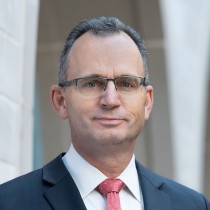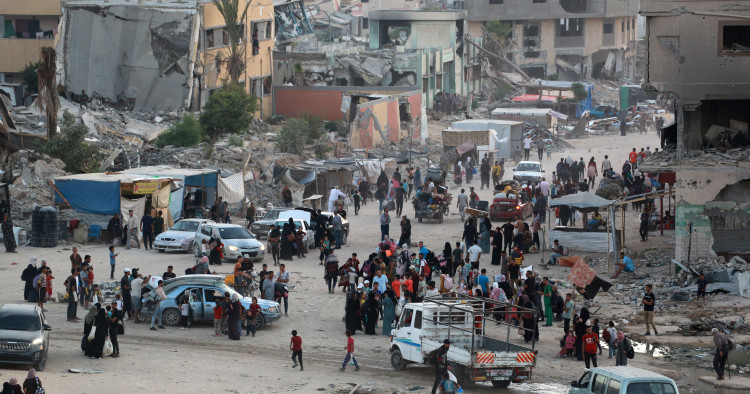Contents:
- Gaza talks could resume as Israel-Hezbollah exchanges escalate
- The Middle East is an afterthought in America’s political debate in 2024
- Netanyahu tries to postpone the ultra-Orthodox conscription crisis, and cling to power well into 2025
- Iranians reject Khamenei’s pleas to vote in Friday’s snap presidential election
- Surrendering to the Taliban in Doha: The UN’s volte-face on Afghanistan
Gaza talks could resume as Israel-Hezbollah exchanges escalate
Paul Salem
Vice President for International Engagement

-
Over the past few days, US mediators have proposed new language to help bridge the gaps between Israel and Hamas on cease-fire negotiations, and an anticipated winding down of major Israeli military operations in Gaza may improve the chances of a deal.
-
A deal on Gaza would also provide an opening to calm the rapidly rising tensions on the Israel-Hezbollah front; while neither Israel nor Hezbollah wants a large-scale war, the risks of backsliding into one remain grave.
Despite the high drama of the Biden administration’s existential crisis after the president’s disastrous performance in the June 27 debate against Donald Trump, the gears of government continue to turn. Over the past few days, US mediators have proposed new language to help bridge the gaps between Israel and Hamas on the negotiations that are to take place between phase one and phase two of the three-phase plan that President Joe Biden announced on May 31. Israeli Prime Minister Benjamin Netanyahu has reiterated his support for the Biden proposal and some Israeli officials have said Israel has approved the new language. Hamas leaders have continued to downplay the imminence of a deal.
On the military front, Israel is moving toward the “third phase” of its operations in Gaza, winding down major military operations and focusing instead on targeted raids based on intelligence. Israel Defense Forces Chief of Staff Herzi Halevi has said that the military was close to considering Hamas’s remaining Rafah battalions as dismantled. This would enable Prime Minister Netanyahu to declare a form of victory over Hamas, even if not a total one, as well as the end of intense fighting in Gaza. This, in turn, might improve the chances of a US-mediated Israel-Hamas deal and would also provide an opening to calm the rapidly rising tensions on the Israel-Hezbollah front.
On that “northern front,” the situation continues to escalate. Israeli jets staged mock raids over Beirut, breaking the sound barrier and causing panic, and Israeli Defense Minister Yoav Gallant threatened to bomb Lebanon “back to the Stone Age.” Iran, for its part, threatened Israel with an “obliterating war” if it attacked Lebanon, and seven states called on their nationals to urgently leave the country.
It remains the case that neither Israel nor Hezbollah wants a large-scale war, but the risks of backsliding into one remain grave. Interestingly, the Hezbollah-aligned press has been closely watching and commenting on the potential end of major Israeli military operations in Gaza as well as the possible inching toward a cease-fire there, indicating that progress in Gaza could still provide an off-ramp to avoid a major war in Lebanon. US special envoy Amos Hochstein is working hard to turn that prospect into a reality.
Follow: @paul_salem
The Middle East is an afterthought in America’s political debate in 2024
Brian Katulis
Senior Fellow for US Foreign Policy

-
Last Thursday’s debate between current US President Joe Biden and former US President Donald Trump underscored how little Middle East issues matter these days in America’s domestic politics.
-
The inclination to use the Middle East as a wedge issue between the two major political parties — and within the parties too — is not likely to produce better policy outcomes.
Anyone looking for deep insights or evidence of a new direction forward for US foreign policy in the Middle East from last Thursday’s presidential debate between Joe Biden and Donald Trump came away sorely disappointed about how superficial the discussion on the region is in America’s domestic politics. This state of affairs is not a surprise — for years, voices on the left and right have used the Middle East and its people as a prop in America’s own political and social debates in a form of neo-Orientalism that is disconnected from the region’s complex realities.
Those who have called for using the Israel-Hamas war or Iran policy as a domestic political issue are unlikely to achieve any meaningful impact in America’s politics today for one simple reason: US foreign policy in the Middle East barely registers as a driver for American voters. Instead, they are mostly concerned about issues closer to home, such as the economy, health care, immigration, and the health of America’s democracy. The year 2024 is not the early 2000s, when the Iraq war and other Middle East issues were higher priorities on America’s political agenda.
This helps explain why both candidates were shallow in their comments on the Middle East in Thursday’s debate. Asked about the Israel-Hamas war, now approaching the nine-month mark, Biden reiterated his talking points supporting a cease-fire, articulated at the end of May, and stressed that Hamas had rejected it. Biden offered no thoughts on possible alternative plans if that policy does not produce results.
For his part, Trump attempted to use Palestinian identity as a slur, saying that Biden had “become like a Palestinian. But they don’t like him, because he’s a very bad Palestinian. He’s a weak one.” When a moderator asked Trump whether he’d support the creation of an independent Palestinian state to achieve peace in the region, Trump simply said, “I’d have to see,” and then pivoted back to an issue that got more airtime in the debate: Russia and NATO. Trump also reminded voters of America’s botched pullout from Afghanistan in 2021, something that created a negative impression about Biden’s handling of foreign policy early in his administration.
The biggest strategic challenge in the region, Iran, came up but only in the 20-20 hindsight, finger-pointing way that has come to characterize many features of America’s political debate these days — there were no clues given by either candidate on how they might handle the threats posed by the regime in Tehran.
This surface-level debate about the Middle East is largely a product of the fact that most Americans don’t see the direct relevance of the region to their lives. It also is the result of a culture in America that has approached these questions for years from mostly a political advocacy standpoint, rather than a strategic perspective.
As I argued at the end of 2023 looking ahead to 2024, “the United States faces no shortage of threats in the Middle East, but one of the biggest things that might hold it back are the challenges it faces from within its own politics.”
The weak performance of both Biden and Trump in last week’s debate on Middle East issues sent a negative message to the region — a message that will likely incentivize a broad range of actors to go their own way and carve out their own path, irrespective of what the United States seeks to do in the coming months. At a time of continued conflict and growing tensions, this does not bode well for the Middle East.
Follow: @Katulis
Netanyahu tries to postpone the ultra-Orthodox conscription crisis, and cling to power well into 2025
Nimrod Goren
Senior Fellow for Israeli Affairs

-
Israel’s Supreme Court ruling calling for ultra-Orthodox conscription may be the catalyst that eventually leads to early elections in Israel.
-
Prime Minister Benjamin Netanyahu is playing for time, postponing the looming coalition crisis, and trying to cling to power in the months ahead, while his rivals are organizing and positioning themselves.
War-related issues have not yet been enough to topple Israeli Prime Minister Benjamin Netanyahu’s government, but ultra-Orthodox conscription may eventually be the political challenge that leads to early elections, which most Israelis have demanded since Oct. 7.
On June 25, the Israeli Supreme Court ruled that ultra-Orthodox must be drafted into the Israel Defense Forces (IDF) and that yeshivas whose students do not enlist should not receive governmental funding. The Attorney General’s Office announced that the IDF should immediately draft 3,000 Haredi students, sparking protests by the ultra-Orthodox community. Parliament is now seeking to formulate a new law by the end of July to settle an issue that has divided Israeli society for decades.
In the context of the war in Gaza, the heavy burden the conflict has been placing on reservists and their families, and the IDF’s urgent need for additional soldiers, such a law will be very difficult for the Knesset’s majority coalition to agree upon. Key Likud figures — Minister of Defense Yoav Gallant and Chair of the Knesset’s Foreign Affairs and Defense Committee Yuli Edelstein — are not playing along with Netanyahu’s deference to the ultra-Orthodox parties on this issue. They insist that any law must enjoy a broad political consensus and also give the army what it needs.
A formula acceptable to all coalition partners is not easy to envision. Contradictory needs and demands are at play and could lead to the collapse of the ruling coalition. For now, there seems to be deadlock. But the decision by the ultra-Orthodox parties not to immediately resign from the government after the court’s ruling gives Netanyahu time; this could enable him to coast along under the status quo until the end of the Knesset’s summer's session, in late July, and, at that point, enter a “political safe zone.”
It will take three months until the Knesset resumes, in late October. Then, if and when the coalition dissolves, 100 days must pass before elections can be held. Early 2025 may, thus, be the earliest timeframe for a vote — far too late for the many in Israel seeking a recovery from Oct. 7 and its aftermath. By the time Israelis eventually go to the polls, much will have happened — not only on the war front, but also in US politics — and Netanyahu hopes this will play to his electoral favor.
This gives the prime minister’s rivals time to organize. Benny Gantz’s National Unity centrist party is seeking to reposition itself now that it is out of government, but it has been losing ground. In turn, Yair Lapid, the leader of the centrist Yesh Atid party, is playing the diplomatic statesmanship card. On June 25, at the Herzliya Conference, he emphasized that unlike Netanyahu, he can enable the implementation of the “Biden package” that includes a cease-fire in Gaza, hostage release, a diffusion of tensions with Hezbollah, and normalization with Saudi Arabia.
On the right wing, efforts are taking place to form a new party, possibly bringing together former Prime Minister Naftali Bennett, former Minister of Defense Avigdor Lieberman, former Mossad chief Yossi Cohen, and others. This speculative grouping already tops public opinion polls. And on the left-wing, under the new leadership of Yair Golan, Labor and Meretz announced a long-awaited merger, into a new joint party named The Democrats. It is currently expected to win 10-12 parliamentary seats, compared to the 4 Labor presently occupies (Meretz is not currently represented in the Knesset).
Israeli politics are always dynamic; but at a time of prolonged and unprecedented security crisis, they become even more unpredictable. Netanyahu is playing for time. He believes he can cling to power for months and seeks to control the timing in which new elections will be called. But others in the political system are searching for ways to speed up the process of change — to be ready for whatever scenario eventually unfolds.
Follow: @GorenNimrod
Iranians reject Khamenei’s pleas to vote in Friday’s snap presidential election
Alex Vatanka
Director of Iran Program and Senior Fellow, Black Sea Program

-
The first round of Iran’s snap presidential elections, held on June 28, made history by setting a record low turnout, estimated to be 39.9% but possibly even lower.
-
Although the moderate-reformist camp’s preferred candidate won in the first round, his extreme conservative opponent may well be pushed through to a victory in the runoff, a result that could bring Iranians out into the streets.
Iran just held its third election in the span of just four months — the quickest tempo since the 1906 constitutional revolution, which mandated that the authorities hold regular general elections. Iranians cast ballots for the Majlis (parliament) in March and May, and voted in the first round of presidential elections on June 28. A fourth contest, the presidential runoff, is scheduled for July 5. And yet the opposite of election fervor has gripped the country. The June 28 election made history by setting a new record low for turnout. The second round, on July 5, is unlikely to see more voters participating. The lowest presidential turnout until this election was in 2021, at 48%.
Official data suggests 39.9% of voters cast a ballot on June 28, but the real figure could easily be lower. Given the chronic lack of transparency into Iran’s bureaucratic order, no outside observer knows for sure. But the trend of fast-declining voter turnout is undeniable. Iranians en masse dismiss elections in the Islamic Republic as a pointless farce. As opposition pundits point out, this is not a case of low turnout but an intentional boycott.
Will Ayatollah Ali Khamenei, the supreme leader who micro-manages elections in Iran, finally listen? He has himself repeatedly said that high voter turnout is indispensable for the future of the Islamist regime and ridiculed political systems where only “35% or 40%” vote. Khamenei had Iran’s Western detractors in mind when he uttered those words; but now, he faces the same humiliating reality at home. He has yet to comment on Friday’s poor turnout. And regardless of how he opts to spin the debacle, he knows this low rate of voter participation was above all against him. His calls for the people to cast their ballots, for “maximum turnout,” have now come back to haunt him. “Every vote in the election is a vote for the Islamic Republic,” he declared in the run-up to the election, and that seems to have sealed its fate.
The election campaign has had a couple of other notable characteristics. First and foremost, the reformist-moderate camp, which Khamenei has routinely marginalized and disempowered, is panicking that the supreme leader will see to it that his apprentice, Saeed Jalili, prevails in the second round against Masoud Pezeshkian, who emerged as the consensus candidate of the regime’s reformist-moderate faction. Alarm bells are going off that a Jalili win in the July 5 runoff will turn Iran into a North Korea-style hermit kingdom or something akin to a Shi’a version of the impoverished, Taliban-ruled Afghanistan.
But such red flags are unlikely to bring more voters out on July 5. In fact, it seems the Iranian public is purposely egging on Khamenei to go ahead and install the excruciatingly ideologically puritan Jalili as his president. That might, after all, be the sort of audacity that could put the Iranian nation at a crossroads. In such a scenario, the implication is clear as day: Political change in the Islamic Republic can only happen if the streets once again erupt. If so, Khamenei will have no one to blame but himself.
Follow: @AlexVatanka
Surrendering to the Taliban in Doha: The UN’s volte-face on Afghanistan
Shanthie Mariet D'Souza
Non-Resident Scholar

-
Ensuring the Taliban’s attendance at the third UN meeting on Afghanistan in Doha required making major concessions to the group, including that no Afghan women representatives participated.
-
The United Nations seems to be making a stark choice between millions of starving Afghans and the thousands of Afghan women and girls who have lost their rights to education and employment.
The third Doha meeting on Afghanistan, convened by the United Nations on June 30-July 1, appears to have served only one purpose: allowing a mid-ranking Taliban official to strike a defiant note at a global forum. Taliban spokesperson Zabihullah Mujahid, who led the group’s delegation, advised Western countries to look beyond women’s rights in Afghanistan and find ways to start doing business with the Taliban and lift sanctions on the regime. Mujahid cited the examples of Kazakhstan, Russia, and Saudi Arabia as countries that are deepening their relationship with Kabul, although there are, in fact, many more as well. The rest of the world should follow suit, Mujahid argued.
At the same time, the huddle in Doha also marked a transformation in the UN’s approach. After holding two earlier meetings at the same venue that excluded the Taliban, it realized the futility of such exercises. However, the change in approach represents a 180-degree turn on the February 2024 position of UN Secretary-General António Guterres, who had objected to the Taliban’s conditions for attending — namely, that the meeting must exclude women and other Afghan groups. To ensure the presence of the Taliban this time around, the UN had to agree that no Afghan women representatives would attend. Worse still, its special envoy for Afghanistan, Roza Otunbayeva, had to defend such a position.
What the UN is doing isn’t hard to discern. It is trying to make a stark choice between millions of starving Afghans and the thousands of Afghan women and girls who have lost their rights to education and employment. A growing number of Western experts and expat Afghans, who benefited from 20 years of international community-backed rule, now advocate that regular Afghans must be the main focus of international action, even if it means allowing the Taliban regime to continue its regressive policies against women, girls, and minorities, which it justifies by citing archaic and contestable Islamic precepts. That both pressing issues — hunger and a lack of access to education among women and girls — can’t be at the center of attention is difficult to fathom, especially since both programs would run on significant international and UN assistance.
There is also another, even more serious interpretation of the UN’s move. Hunger-induced instability could potentially displace more Afghans than the lack of education and employment for girls and women, pushing them toward Western countries. Is the UN now focused on preventing such a scenario, not by using the leverage provided by its financial assistance on the Taliban but merely by pursuing a policy that mirrors that of Russia, China, Iran, and others? While one hopes this is not the case, the compromise is unsettling.
The Doha meeting wasn’t about solving the challenge that Taliban rule poses to Afghans inside the country and the wider world. Instead, it perhaps marks the beginning of a long road of consultations with the Taliban. However, by allowing the Taliban to dictate the terms of the meeting this time around, the UN may have set a dangerous precedent, landing itself in a trap that it may find difficult to escape in the future.
Follow: @shanmariet
Photo by BASHAR TALEB/AFP via Getty Images
The Middle East Institute (MEI) is an independent, non-partisan, non-for-profit, educational organization. It does not engage in advocacy and its scholars’ opinions are their own. MEI welcomes financial donations, but retains sole editorial control over its work and its publications reflect only the authors’ views. For a listing of MEI donors, please click here.













